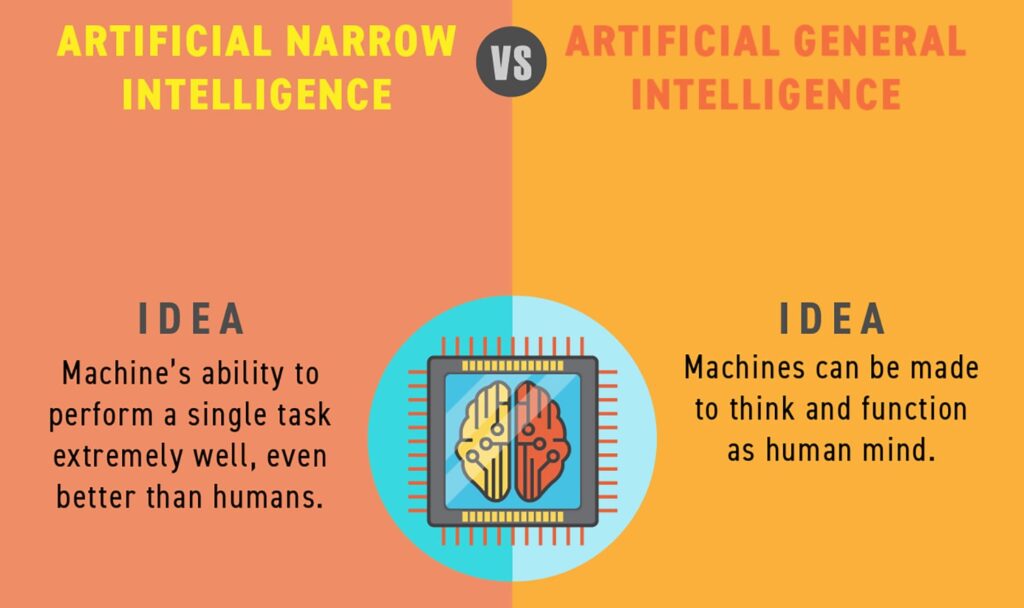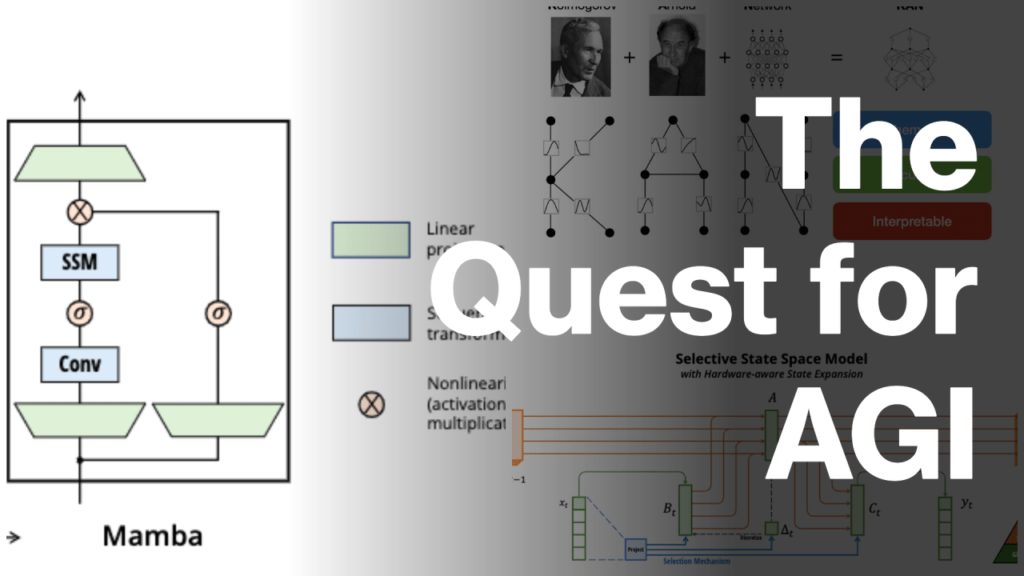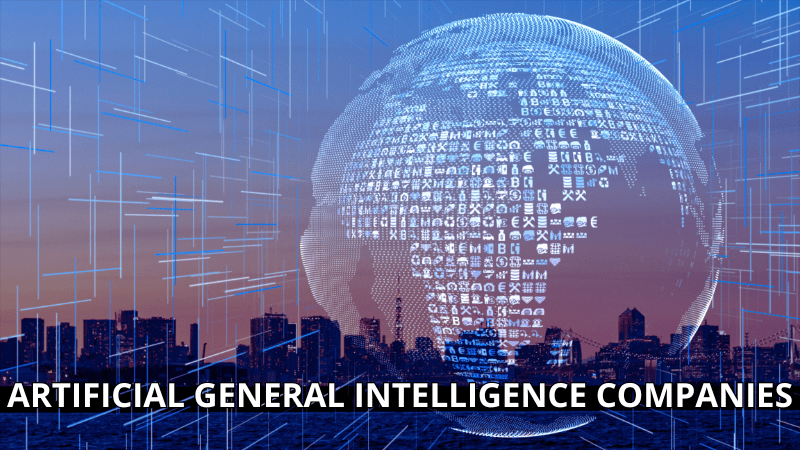Imagine a machine that can learn, understand, and apply knowledge like a human being. Artificial General Intelligence (AGI) is the holy grail of AI research, with the potential to revolutionize every aspect of our lives. From science and medicine to art and entertainment, AGI promises to unlock unprecedented levels of innovation and productivity. But what exactly is AGI, and how close are we to achieving it? In this article, we’ll delve into the significance of AGI, its current state, and the exciting possibilities that await us on the horizon. Let’s dive in! Artificial General Intelligence Companies
Artificial General Intelligence vs. Narrow AI: What’s the Difference?

As we navigate the exciting world of AI, it’s essential to understand the distinction between Artificial General Intelligence (AGI) and Narrow or Weak AI. While both are forms of artificial intelligence, they differ significantly in their capabilities, applications, and potential impact on our lives. Artificial General Intelligence Companies
Narrow AI: The Specialist
Narrow AI, also known as Weak AI, is designed to perform a specific task, and it excels in that particular domain. It’s like a skilled professional, exceptional in their field but not necessarily knowledgeable in others. Narrow AI is everywhere, from virtual assistants like Siri and Alexa to image recognition software and recommendation algorithms on Netflix. Artificial General Intelligence Companies
For instance, a Narrow AI system can:
- Beat a human chess champion (IBM’s Deep Blue)
- Recognize faces with high accuracy (Facebook’s facial recognition)
- Translate languages in real-time (Google Translate)
However, these systems are limited to their specific domain and can’t generalize their intelligence to other areas. They’re like a master chef who can create exquisite dishes but struggle with basic math. Artificial General Intelligence Companies
Artificial General Intelligence: The Renaissance Person
Artificial General Intelligence, on the other hand, aims to replicate human-like intelligence, with the ability to learn, understand, and apply knowledge across a wide range of tasks. AGI is like a polymath, capable of excelling in various domains, from science and art to social skills and common sense. Artificial General Intelligence Companies
GI would be able to:
- Learn from experience and adapt to new situations
- Understand natural language and communicate effectively
- Reason and problem-solve like a human
Imagine having a personal assistant who can not only schedule appointments but also offer advice on relationships, guide career development, and even create art that inspires. That’s the promise of AGI! Artificial General Intelligence Companies
The AGI Pioneers: Companies Leading the Charge

As we venture into the fascinating realm of Artificial General Intelligence, it’s essential to acknowledge the trailblazers driving this revolution. From tech giants to innovative startups, these companies are pouring their hearts, souls, and resources into making AGI a reality. Let’s take a closer look at some of the prominent players: Artificial General Intelligence Companies
1. Google DeepMind: The AI Powerhouse
Google’s DeepMind is a household name in AI research. Their AlphaGo system famously defeated a human world champion in Go, showcasing the power of Narrow AI. Now, they’re tackling AGI with projects like AlphaZero, which masters various games and tasks with a single algorithm. Artificial General Intelligence Companies
2. Microsoft Research: The AGI Visionary
Microsoft Research is actively exploring AGI through various initiatives, such as the Microsoft Cognitive Toolkit (CNTK). Their researchers are working on developing more human-like AI, capable of reasoning and decision-making. Artificial General Intelligence Companies
3. Facebook AI Research Lab (FAIR): The Social AI
FAIR is focused on developing AGI that can interact with humans in more natural ways. Their research includes projects like the “Dialog Agent,” which can engage in conversation and even exhibit a sense of humor! Artificial General Intelligence Companies
4. NVIDIA: The AI Hardware Pioneer
NVIDIA is leading the charge in developing specialized hardware for AI computing. Their graphics processing units (GPUs) power many AGI research projects, enabling faster processing and more efficient learning. Artificial General Intelligence Companies
5. Vicarious: The AGI Startup
Vicarious, a secretive startup, is tackling AGI with a unique approach inspired by the human brain’s neocortex. Their AI system, called the “Recursive Cortical Network,” aims to replicate human-like intelligence. Artificial General Intelligence Companies
6. Numenta: The Theoretical Foundations
Numenta, founded by Jeff Hawkins (inventor of the PalmPilot), focuses on developing a theoretical framework for AGI. Their work on Hierarchical Temporal Memory (HTM) aims to replicate the human brain’s ability to learn and adapt. Artificial General Intelligence Companies
The AGI Quest: Goals and Objectives

As we venture into the world of Artificial General Intelligence, it’s essential to understand the driving forces behind the companies pioneering this field. What are their goals and objectives? Are they seeking to create human-like intelligence or solve complex problems? Let’s dive in and explore the motivations and aspirations of AGI companies. Artificial General Intelligence Companies
1. Human-Like Intelligence: The Holy Grail
Some AGI companies aim to create intelligent machines that rival human cognition. They seek to develop AI systems that can learn, reason, and apply knowledge like humans. For instance:
- Google DeepMind’s AlphaZero aims to master various games and tasks, demonstrating human-like intelligence.
- Microsoft Research’s AGI project focuses on developing AI that can reason and make decisions like humans.
2. Complex Problem-Solving: The Pragmatic Approach
Other AGI companies focus on developing AI that can tackle complex, real-world problems. They prioritize practical applications over human-like intelligence. For example:
- NVIDIA’s AI research focuses on solving challenges in healthcare, finance, and climate modeling.
- Vicarious aims to develop AGI that can learn from experience and adapt to new situations, applicable to various industries.
3. Augmenting Human Capabilities: The Synergistic Approach
Some companies strive to create AGI that complements human abilities, enhancing our productivity and potential. They envision AI as a tool that amplifies human intelligence, rather than replacing it. For instance:
- Facebook AI Research Lab (FAIR) explores AGI that can interact with humans in more natural ways, augmenting our social and cognitive abilities.
- Numenta’s Hierarchical Temporal Memory (HTM) aims to replicate the human brain’s learning and adaptation mechanisms, potentially enhancing human intelligence.
4. Ethical and Societal Impact: The Responsible Approach
A growing number of AGI companies prioritize ethical considerations and societal impact. They recognize the potential risks and benefits of AGI and strive to develop AI that aligns with human values. For example:
- Microsoft Research’s AGI project includes a focus on ethical AI development, ensuring that AI systems are transparent, explainable, and fair.
- Google DeepMind’s AI ethics team explores the potential consequences of AGI, working to develop AI that benefits humanity.
The AGI Toolbox: Approaches and Technologies
As we delve into the world of Artificial General Intelligence, it’s fascinating to explore the diverse approaches and technologies employed by AGI companies. Each approach has its strengths and weaknesses, and companies often combine multiple methods to achieve their goals. Let’s take a closer look at some of the key technologies and techniques: Artificial General Intelligence Companies
1. Machine Learning: The Data-Driven Approach
Machine learning is a cornerstone of many AGI companies. This approach enables AI systems to learn from data, identify patterns, and make predictions or decisions. For instance:
- Google DeepMind’s AlphaGo uses machine learning to master the game of Go.
- NVIDIA’s AI research leverages machine learning for image recognition, natural language processing, and more.
2. Deep Learning: The Neural Network Revolution
Deep learning is a subset of machine learning that utilizes neural networks to analyze data. This approach has led to breakthroughs in image recognition, speech recognition, and natural language processing. For example:
- Facebook AI Research Lab (FAIR) uses deep learning for facial recognition, language translation, and more.
- Microsoft Research’s AGI project employs deep learning for reasoning and decision-making.
3. Symbolic Reasoning: The Logic-Based Approach
Symbolic reasoning involves using logical rules and symbols to represent knowledge and reason about the world. This approach is useful for tasks that require explicit reasoning and problem-solving. For instance:
- Numenta’s Hierarchical Temporal Memory (HTM) uses symbolic reasoning to model human cognition and learning.
- Vicarious’s AGI system employs symbolic reasoning for problem-solving and decision-making.
4. Hybrid Approaches: Combining the Best of Both Worlds
Many AGI companies combine multiple approaches to leverage their strengths. For example:
- Google DeepMind’s AlphaZero uses both machine learning and symbolic reasoning to master various games and tasks.
- Microsoft Research’s AGI project integrates machine learning, deep learning, and symbolic reasoning for more robust AI systems.
5. Cognitive Architectures: The Human-Inspired Approach
Cognitive architectures aim to replicate human cognition and provide a framework for integrating multiple AI systems. For instance:
- Numenta’s HTM is inspired by the human brain’s neocortex and aims to replicate its learning and adaptation mechanisms.
- Vicarious’s AGI system uses a cognitive architecture to integrate multiple AI modules and simulate human-like intelligence.
Recent Breakthroughs and Advancements in AGI Research and Development
Artificial General Intelligence (AGI) is a type of AI that aims to replicate human-like cognitive abilities, including reasoning, problem-solving, perception, learning, and language comprehension ¹. Researchers are actively exploring various approaches to achieve AGI, leading to several recent breakthroughs and advancements. Some of the notable developments include: Artificial General Intelligence Companies
Hybrid Learning Models:
Combining symbolic reasoning with deep learning to enhance generalization capabilities ². This approach has shown promise in tasks requiring multi-modal data interpretation, such as understanding natural language and visual information simultaneously. Artificial General Intelligence Companies
Scaling Neural Language Models:
Larger neural language models have demonstrated emergent properties similar to human cognition, such as understanding context and nuance ². OpenAI’s GPT-4 is a prime example of this phenomenon. Artificial General Intelligence Companies
Reinforcement Learning:
This approach enables AGI systems to solve complex problems autonomously, making them more adaptable and resilient ². Reinforcement learning algorithms learn by interacting with their environment, receiving feedback, and adjusting their actions accordingly. Artificial General Intelligence Companies
Ethical Considerations:
As AGI systems become more capable, ensuring they align with human values is crucial ². Researchers are focusing on developing robust frameworks for ethical oversight and alignment to mitigate potential risks. Artificial General Intelligence Companies
Real-Life Examples and Implications
- Artistic Collaboration: AGI systems can collaborate with humans to generate creative content, such as art, music, and writing.
- Scientific Discovery: AGI can aid scientists in analyzing complex data, identifying patterns, and making discoveries.
- Decision-Making: AGI systems can assist in decision-making processes, providing insights and recommendations based on vast amounts of data.
Challenges and Future Directions
- Value Alignment: Ensuring AGI systems align with human values and ethics is a significant challenge.
- Interdisciplinary Collaboration: Addressing technical and ethical challenges requires collaboration across multiple disciplines.
- Transparency and Accountability: Promoting transparency and accountability in AGI research and development is crucial for building trust and ensuring responsible AI development.
The AGI Challenge: Navigating Ethical Concerns, Data Quality, and Computational Power
As AGI companies push the boundaries of artificial intelligence, they encounter a multitude of challenges and limitations. These obstacles not only hinder progress but also raise important questions about the responsible development and deployment of AGI systems. Artificial General Intelligence Companies
Ethical Concerns: The Human Factor
Ethical considerations are at the forefront of AGI development. Companies must address concerns such as:
- Bias and Fairness: Ensuring AGI systems don’t perpetuate existing biases and discriminate against certain groups.
- Transparency and Explainability: Developing AGI systems that provide clear explanations for their decisions and actions.
- Accountability and Responsibility: Establishing clear guidelines for AGI development and deployment to prevent potential misuse.
Data Quality: The Foundation of AGI
High-quality data is essential for training and validating AGI systems. However, companies face challenges such as:
- Data Scarcity: Obtaining sufficient amounts of relevant data to train AGI models.
- Data Quality: Ensuring data accuracy, completeness, and consistency.
- Data Diversity: Collecting data that represents diverse perspectives and scenarios.
Computational Power: The Processing Bottleneck
AGI systems require significant computational resources to process vast amounts of data. Companies must address challenges such as:
- Scalability: Developing AGI systems that can scale efficiently with increasing data and complexity.
- Energy Efficiency: Reducing the energy consumption of AGI systems to minimize environmental impact.
- Hardware Limitations: Overcoming hardware constraints to support the processing demands of AGI systems.
Real-Life Examples and Implications
- Facebook’s AI Ethics Team: Addressing ethical concerns and developing guidelines for responsible AGI development.
- Google’s Data Quality Initiative: Improving data quality and ensuring data accuracy for AGI model training.
- NVIDIA’s Computational Power Breakthroughs: Developing specialized hardware to support AGI processing demands.
Navigating the AGI Challenge
As AGI companies continue to push the boundaries of artificial intelligence, they must prioritize ethical considerations, data quality, and computational power. By acknowledging and addressing these challenges, we can ensure the responsible development and deployment of AGI systems that benefit humanity. Artificial General Intelligence Companies
AGI in Action: Transforming Industries and Improving Lives
Artificial General Intelligence (AGI) has the potential to revolutionize numerous industries and aspects of our lives. From healthcare and finance to education and entertainment, AGI can bring about significant improvements in efficiency, accuracy, and decision-making. Let’s delve into some potential real-world applications of AGI and explore their impact. Artificial General Intelligence Companies
Healthcare: Enhancing Patient Care and Outcomes
AGI can transform healthcare by:
- Analyzing medical data: AGI can quickly process vast amounts of medical data, identifying patterns and insights that human clinicians might miss.
- Personalizing treatment plans: AGI can help create personalized treatment plans tailored to individual patients’ needs.
- Streamlining clinical workflows: AGI can automate administrative tasks, freeing up healthcare professionals to focus on patient care.
Real-Life Example: IBM’s Watson for Oncology uses AGI to analyze cancer data and provide personalized treatment recommendations. Artificial General Intelligence Companies
Finance: Optimizing Investments and Risk Management
AGI can transform finance by:
- Analyzing market trends: AGI can quickly process vast amounts of financial data, identifying patterns and insights that human analysts might miss.
- Optimizing investment portfolios: AGI can help create personalized investment portfolios tailored to individual investors’ goals and risk tolerance.
- Detecting fraudulent activity: AGI can identify potential fraud and alert financial institutions to take action.
Real-Life Example: BlackRock’s AI-powered investment platform uses AGI to optimize investment portfolios and improve returns.
Education: Enhancing Learning and Accessibility
AGI can transform education by:
- Personalizing learning plans: AGI can help create personalized learning plans tailored to individual students’ needs and abilities.
- Intelligent tutoring systems: AGI can power intelligent tutoring systems that provide one-on-one support to students.
- Accessibility tools: AGI can help create tools that make learning more accessible for students with disabilities.
Real-Life Example: Georgia Tech’s AI-powered learning platform uses AGI to personalize learning plans and improve student outcomes. Artificial General Intelligence Companies
The AGI Future: Unveiling the Possibilities
As we stand at the threshold of AGI development, it’s essential to speculate on its future and the potential impact on society. Will AGI revolutionize industries and improve lives, or will it pose unprecedented risks? Let’s delve into the possibilities and explore the implications for humanity. Artificial General Intelligence Companies
Potential Impact on Society:
- transforming Industries: AGI could revolutionize healthcare, finance, education, and more, leading to unprecedented efficiency and innovation.
- Job Displacement: AGI might displace certain jobs, especially those with repetitive tasks, but it could also create new job opportunities in AGI development, training, and deployment.
- Social Inequality: AGI could exacerbate existing social inequalities if access to AGI technology is limited to the wealthy or privileged.
Real-Life Example: Amazon’s AGI-powered customer service chatbots have transformed customer experience, but also raised concerns about job displacement. Artificial General Intelligence Companies
Implications for Humanity:
- Existential Risks: AGI poses potential existential risks if not developed responsibly, such as losing control over AGI systems or creating an AGI that prioritizes its interests over humanity.
- Ethical Considerations: AGI raises ethical concerns, such as ensuring AGI systems align with human values and don’t perpetuate biases.
- Human Evolution: AGI could potentially enhance human cognition and capabilities, leading to a new era of human evolution.
Real-Life Example: Elon Musk’s Neuralink project aims to integrate AGI with human brains, potentially enhancing human cognition and capabilities. Artificial General Intelligence Companies
The AGI Future: A Call to Action
As we venture into the AGI era, it’s crucial to prioritize responsible development, ensuring AGI aligns with human values and benefits society as a whole. By acknowledging the potential risks and opportunities, we can create a future where AGI enhances humanity’s prosperity and well-being. Artificial General Intelligence Companies


Pingback: ISO 31000 - aitechverge.com
Pingback: Fundamentals Of Data Engineering - aitechverge.com
Pingback: AI Techniques In Artificial Intelligence - aitechverge.com